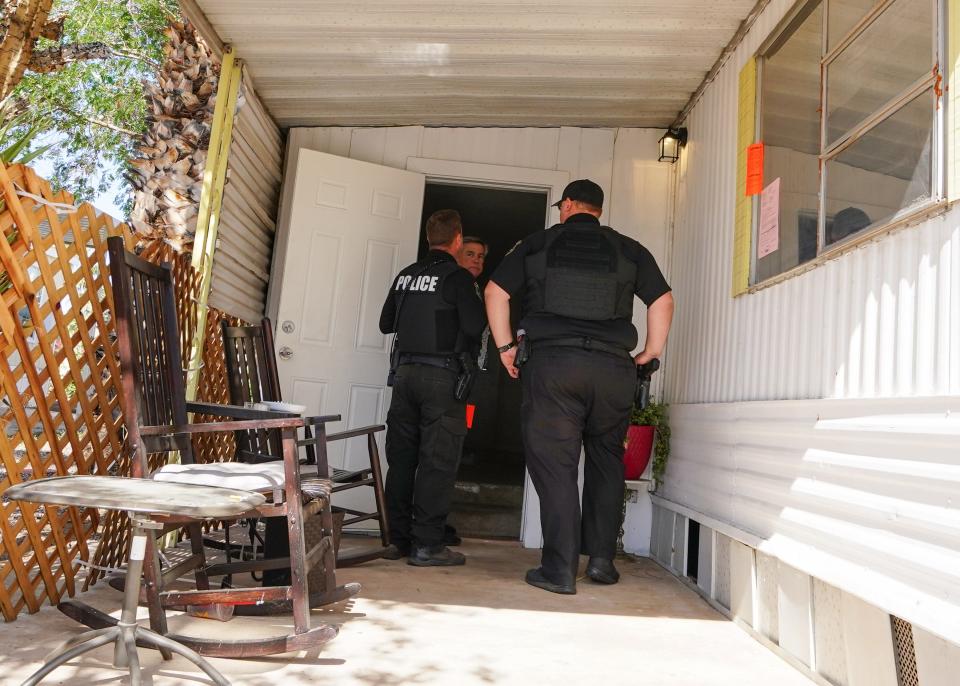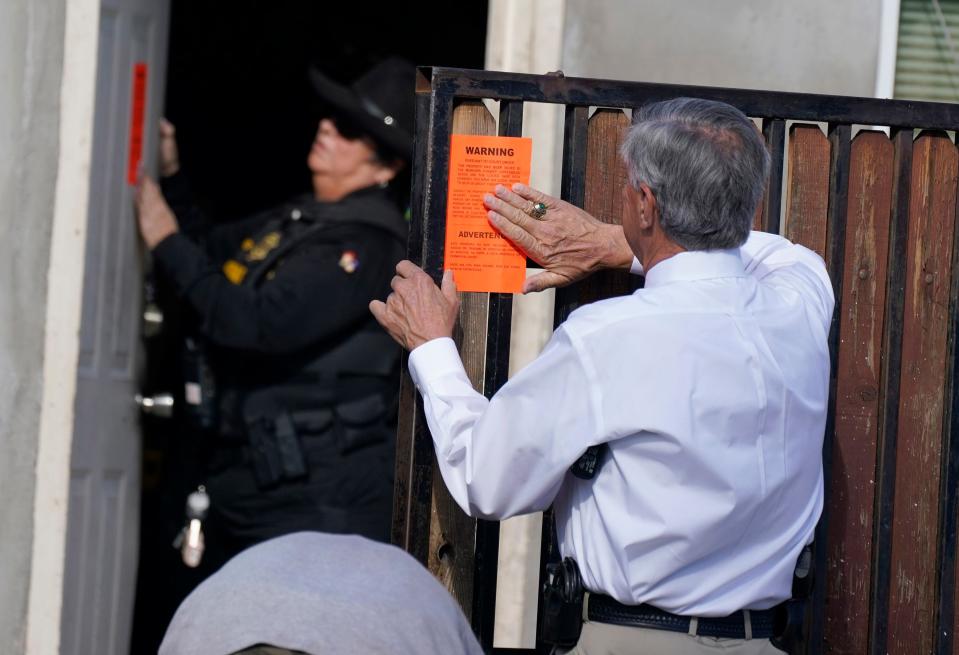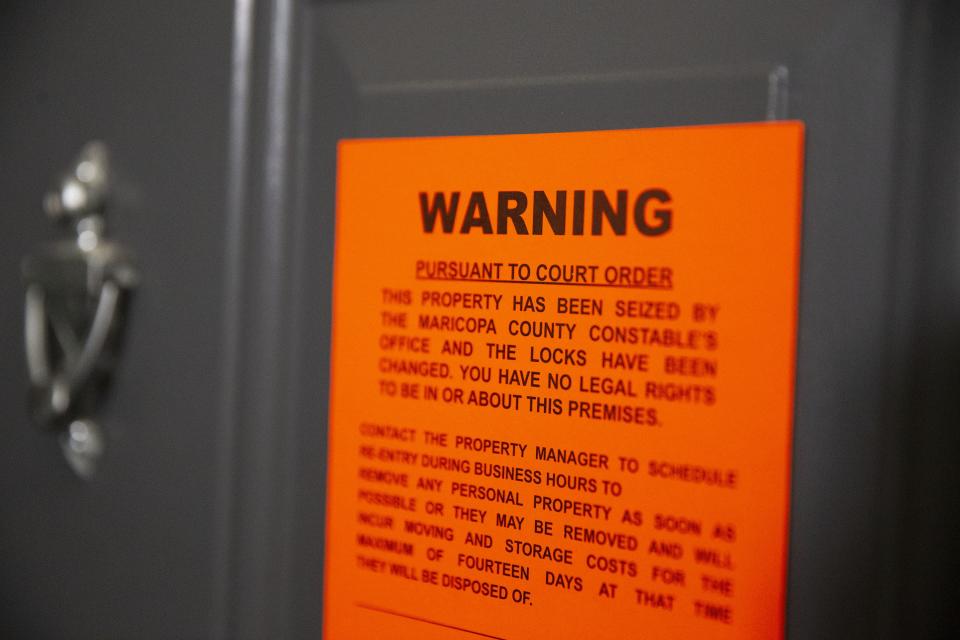Arizona board with close ties to landlord group oversees constables who serve eviction writs
When renters are evicted, constables deliver the court orders — sought by landlords — that demand the tenants move out.
But the board that trains and disciplines Arizona's elected constables has close ties to the most powerful landlord group in the state.
The relationship drew new scrutiny during the COVID-19 pandemic, when constables played an even more important role in the eviction process, sometimes deciding whether tenants qualified for eviction moratoriums.
The Constable Ethics, Standards and Training Board has been administered by Capitol Consulting since 2014. The CEO of that group, Courtney LeVinus, is also the CEO of the Arizona Multihousing Association.
State law also requires that a representative from the Arizona Multihousing Association serve on the Constable Board, which some tenant advocates say creates an unfair bias when the board hears complaints. State law doesn't require a board member who specifically represent tenants.
Relatively few constable complaints have been filed since 2015, according to an Arizona Republic investigation. Of those, the Constable Board didn’t side with any renters who filed complaints but did for landlords several times.
A former constable says oversight of the constables needs to be reformed, citing the board's relationship with the state landlord association.
But David Leibowitz, a spokesman for the Arizona Multihousing Association who also provided responses for Capitol Consulting, said there is no conflict of interest.

“In its contractual role with the CESTB (the Constable Board), the firm has been hired to provide clerical support and office space. That’s it,” he said.
It is unusual for the state to hire an outside entity to manage a board instead of employing state employees to do the job. Megan Rose, spokesperson for the Arizona Department of Administration, said she was not aware of any other boards managed this way.
The unique management setup and the connection between constables and landlords has some advocates and ethics experts concerned about a real or perceived conflict of interest.
“It’s outrageous and pure political patronage,” said Corinne Cooper, a Tucson landlord, tenant advocate and former law professor, of the connection between the Constable Board and the Arizona Multihousing Association.
John Pelissero, senior scholar at the Markkula Center for Applied Ethics at Santa Clara University, said the fact that the consulting firm also represents landlords can cause an appearance of a conflict, which can be as damaging as an actual conflict.
For more stories that matter, subscribe to azcentral.com.
"It can undermine the confidence that the public has in the workings of the constable's office," he said.
He said the state should consider adopting policies that would prohibit firms from winning state contracts to manage boards or agencies if they also work with entities that will interact with those boards or agencies.
"Minimally, you want to do everything to avoid the appearance that you're not acting in the public interest," Pelissero said.
The Constable Ethics Board doesn't have the power to suspend or fire a constable, and The Republic found some of the board's recommendations for the elected officials to resign or retire were ignored.
In nine complaints, the board recommended the constable resign, retire or be suspended. At least three did not resign.
Constable Board's landlord connection
The state's Constable Board is made up of seven members: two constables, a justice of the peace, a county administrator, an appointee from the Arizona Peace Officer Standards Board, a member of the public appointed by the governor and a member of the Arizona Multifamily Association, also appointed by the governor.
The board was created by state law in 2007, replacing the Constable Ethics Committee, which had been established in 2001.
In 2007, the state solicited proposals from private organizations to take over administration of the board, which was previously managed by the Arizona Association of Counties.
Capitol Consulting, the only entity to respond to the state's solicitation, was awarded a one-year contract, which later was extended to 2019. In 2019, the state entered into a new contract with Capitol Consulting, which expires in 2022.

The state pays the consulting group $36,000 per year to provide office space for the board and handle all of the board's administrative needs — such as processing complaints, preparing for meetings and handling all correspondence.
The office used by the board is shared by the Arizona Multihousing Association, a 20-year client of Capitol Consulting. LeVinus, Capitol Consulting president and co-founder, also has served as the CEO of the Arizona Multihousing Association since 2018.
In Capitol Consulting's proposals, the company said LeVinus would be the "primary point of contact and administrator for CESTB." It also said LeVinus was "one of the original stakeholders developing and supporting the legislation establishing CESTB."
In the proposal, Capitol Consulting disclosed it also works for the Arizona Multihousing Association, Arizona Property Owners and Landlords Association and other organizations related to real estate.
"We do not believe there will be any direct or indirect conflicts of interest," Capitol Consulting said in its proposal.
Rose said the State Procurement Office did not identify any conflicts of interest before the approval of Capitol Consulting's contract.
Leibowitz, who answered questions for Capitol Consulting, said there is "no conflict of interest at all, nor is there even the appearance of a conflict," because Capitol Consulting only provides clerical support and does not have any "decision-making authority over any constable in the state of Arizona or over the Constable Ethics Standard and Training Board."
"The firm plays no role in the investigation or adjudication of complaints made against constables and no one associated with the firm sits on the board," he said.
Mike Cobb, a Mohave County constable representing the Kingman precinct who also serves on the Constable Board, said he doesn't believe the Arizona Multihousing Association has any influence over the board. Capitol Consulting only provides one employee to assist the board, and it's not LeVinus, he said.
"In all the time I've been there, you wouldn't even know (the Arizona Multihousing Association) had anything to do with anything," said Cobb, who has been on the board for four years.
Maricopa County Constable Scott Blake, representing the Hassayampa precinct, is the chair of the Constable Ethics, Standards and Training Board. He provided a written response to The Republic's questions on behalf of the board.
He said he doesn't know how any landlord group, including the Arizona Multihousing Association, could influence the board. He said Capitol Consulting's work for the board is purely clerical.
"All (board) decisions whether financial or complaint related are made during public meetings, and records of the (board) are open for public review, so everything is very transparent," Blake said.
Beyond the Capitol Consulting connection, state law requires a board member from the Arizona Multihousing Association to sit on the Constable Ethics, Standards and Training Board. Currently, that is Christine Shipley, vice president of Dunlap and Magee Property Management Inc., which manages 51 Arizona apartment complexes.
She didn't respond to requests for comment.
Cooper, the landlord and tenant advocate in Tucson, said that if landlords get a seat on the board, a member representing tenants should sit on the board as well.

Constables key to eviction process
Constables are also responsible for serving orders of protection and subpoenas, but they are most known for their role in evictions.
If an Arizona justice of the peace grants an eviction judgment to a landlord against a tenant, then a writ can be issued. A constable is charged with enforcing it and physically removing the renter from the property one to five days later.
Constables, who are elected to four-year terms, do not have to have any law enforcement experience but must complete 16 hours of training per year. Unlike sheriff's deputies, they don’t generally wear uniforms or drive marked cars, but they do carry badges and can carry guns.
Constables' annual salaries are determined by the number of registered voters in their precincts but cannot exceed $67,000.

Michael Stevenson, the presiding constable for Pima County representing precinct 10, said tenants have a range of reactions with constables show up at their doors.
"Some people know, and they will say, ‘Yes, I know this was coming. All right I will get my stuff and be gone.’ Other people will try and put if off and say, ‘I had no idea this was coming,'" Stevenson said.
Constables played an even bigger role in the eviction process during the pandemic, sometimes deciding if the state or federal eviction bans applied to tenants.
Cobb said many tenants did not understand that not all evictions were prevented by the moratoriums. Constables were often the ones who had to explain that some evictions could continue — a challenging and contentious situation, he said.
"The problem was everyone heard 'no evictions,' and they thought in their minds they didn't have to pay rent," he said.
Now that the eviction moratoriums are over, constables are even busier as the number of evictions and writs climb. Eviction filings in Maricopa County increased by 42% in September from August. Writs nearly doubled in September to 310.
“Constables are an important part of the eviction process,” said Pamela Bridge, director of advocacy and litigation at Community Legal Services. “But our relationship is often tough with them because they are seen as the bad guys by tenants.”
Few constable complaints filed
Despite the difficult job of enforcing evictions, few complaints are filed against the state’s constables and rarely by renters, according to The Republic's investigation.
The Constable Board investigates complaints about constables and can issue warning letters and suspension recommendations, but they can't suspend constables. The board also can initiate the complaint process. Typically, board-initiated complaints are related to missed training courses, which the group also tracks.
Cobb said the board reviews complaints submitted by the public at its formal meetings. It decides whether the complaint has merit or if it pertains to something outside of the board's scope and should be dismissed without further investigation.
Since 2015, Arizonans have filed 142 complaints against constables based on data reviewed by The Republic, including 87 in Maricopa County.
If the board decides a complaint has merit, the constable can respond and the person who submitted the claim can submit additional information. Two months later, the board makes a final decision and suggests discipline recommendations.
Forty-four complaints resulted in some type of discipline, mostly warnings or letters of reprimand.
Sixteen were filed by the Constable Ethics Board because of training infractions.
Seven complaints were filed by a county or court system, and another 12 were filed by landlords.
One was from a constable who self-reported, and there was another single case from the Arizona Constables Association, a trade group that represents constables' interests.
The remaining seven complaints were from citizens unhappy with how the constable served paperwork.
Warnings over landlord complaints
Most of the 12 successful landlord-initiated complaints accused constables of being rude or unprofessional or not enforcing a writ quickly enough.
A landlord in Pima County filed a complaint against Precinct 6 Constable Bennett Bernal in 2016 after she claimed he inappropriately allowed a tenant extra time to leave a rental unit.
"I had to tell them to leave. This is not my job. We pay $104.50 for the writs to be served," the landlord wrote in the complaint.
In his response, Bernal said he allowed the family he was supposed to evict to stay until the next morning because one of the teenage children "was visibly ill, apparently with 'the flu and some women's issues.'" He also gave the mother a $50 Fry's gift card to buy the children food.
"As a constable we are faced with difficult situations, especially when it comes to evicting children who are ill. As you know under the code of ethics we must be professional and take safety and well being of all parties into consideration when making decisions and using our discretion," he said.
The board ultimately decided the constable acted appropriately in allowing the family extra time but still issued Bernal a warning because he incorrectly filled out the eviction paperwork.
A landlord in Pinal County filed a complaint against Constable Benny Crow in 2018 for refusing to remove an elderly tenant in a timely fashion.
The landlord alleged Crow said, "You have a problem. She is a Black, 73-year-old woman. If you decide to call the police to remove her it's going to be a mess," and allowed the woman to stay in her apartment until a family member in California could come pick her up.
In response to the complaint, Crow said, "It was my determination that if I forced her out of the unit it would be to nowhere but the streets in Casa Grande where she would not be safe. In my best judgement, Ms. Cavarro was extremely vulnerable and should not be forced to vacate the apartment without the assistance of a friend or family member who could ensure her well being."
The board ruled that the time it took Crow to complete the eviction was excessive and issued him a warning.

Renter complaints dismissed
Renters in eviction cases filed only eight complaints in the more than six years of records examined by The Republic, but none resulted in discipline. The number is a sliver of tenants who come into contact with constables. In Maricopa County alone, more than 100,000 writs requiring constables to process an eviction were filed during the same period.
Housing advocates say many renters don’t know how constables are regulated or how to file a complaint.
The renters who did complain often said constables were rude while conducting an eviction or claimed constables evicted people when they should not have.
A renter in Avondale filed a complaint against County Meadows Constable Kenneth Sumner in 2019, claiming he "belittled and bullied" her family during an eviction. She said Sumner told her kids, "Your mom isn't getting this place back even if she pays the money," and said he was friends with the apartment manager outside of work.
After reviewing a statement from Sumner, the board "concluded the situation was a difficult and stressful one, and constable’s demeanor and actions were misinterpreted" and dismissed the complaint.
In an email to The Republic, Sumner said he was surprised by the complaint because it was a "fairly uneventful eviction."
He said when he arrived the renter said she was going to the office to pay rent, but she didn't return. Sumner then knocked on the door again and told the woman's teenage children he had to change the locks and they left the property.
Sumner said he believes no one was disrespected or mistreated during the eviction, but said, "a complaint — valid or not — is a good reminder for any constable to treat all defendants with respect."
"I have always taken that responsibility to heart, and I strive to be courteous and compassionate every day. Evictions are tough on everyone involved. It is a disservice to be rough or unconcerned with the people whose lives are impacted," he said.
In 2017, a renter filed a complaint against Cobb, the Mohave County constable on the board, saying he "blasted his horn" outside the man's trailer before coming to the door.

"Why does it have to be a neighborhood notification when bringing papers to someone? All they have to do is pull up and knock. Horns are not necessary. Is that professional or courteous or necessary?" the renter said in the complaint.
The board unanimously dismissed the complaint without a formal review, saying it "determined Constable Cobb performed the requested service in an appropriate manner."
Cobb "recused himself from all discussion and action taken by the Board in this matter," the board wrote, "to avoid even the appearance of impropriety."
In an interview with The Republic, Cobb said the man's trailer was parked a half-mile from any other home and he honked because the man's door faced away from the road and he didn't want to surprise him.
Former constable calls for change
The whole constable process in Arizona needs reform, said Joe Ferguson, a former Pima County constable of Precinct 9. Constables should be less police-oriented and try "to better serve not just the landlords but the tens of thousands of vulnerable people we encounter every year," he said.
Ferguson would like to see constables provide more outreach to tenants on the brink of eviction to let them know their options before they are forced from their homes.
The Pima County Board of Supervisors appointed Ferguson to fill a vacant constable position in January 2020 after the elected constable retired. Then COVID-19 began to spread across the country.
Before Gov. Doug Ducey instituted a statewide eviction moratorium, all constables in Pima County, Republican and Democratic, decided to temporarily halt evictions until they received guidance from the governor or state health department on how to proceed, Ferguson said.
"Throwing someone out on the street that was COVID positive in February or March of 2020 sounded like a draconian idea," he said.
But the Constable Board immediately pushed back and urged the county to continue with evictions, Ferguson said. He said he believes the board's opposition was driven by its close relationship to the Arizona Multihousing Association. The landlord association opposed all eviction moratoriums throughout the pandemic.
Ferguson said the board subjectively issued complaints against constables as a way to discourage tenant-friendly constables.
"Those complaints are a huge tool in terms of trying to control constables, who are independently elected," he said.
During the pandemic, Ferguson and several other Pima County constables tried to do more outreach to tenants facing eviction to make sure they knew about resources and the eviction process. The Pima County Board of Supervisors also hired a social worker to work with constables to provide renters with resources.

More of these programs should be adopted throughout Arizona, Ferguson said. But the Constable Board "actively intimidated" constables involved in the program and "certainly tried to stop the program," he said.
"I think that it's justified at this point to consider trying to get a new management company to oversee the Constable Board through a fair, ethical process. They should start over," Ferguson said.
Like tenant advocates, he also said state law's requirement that an Arizona Multifamily Association board member serve on the board gives landlords too much power over it.
Ferguson lost his election in November and is no longer a constable. The Arizona Multihousing Association's political action committee donated to his opponent's campaign.
Constable points to progress on discipline
Cobb said the Constable Board serves an important purpose, saying it has helped constables improve their performance and recommended constables be removed from office when their issues are beyond remedy.
He also said the board never took any action against the Pima County constables for enacting their own eviction moratorium, but noted some board members — including him — were concerned about the policy.

He said a constable's job is to follow a judge's orders, and Pima County constables were not doing that when they unilaterally decided to halt evictions.
"It's not our job to make the ruling, it's the judges' job to make the ruling," Cobb said.
He said he believes most constables treat all involved parties fairly, but because of the difficult role constables play in the eviction process, people sometimes don't feel that way.
The Constable Board exists to remedy those concerns, he said.
Cobb said he's proud of the work done by board during his tenure. He said through the board's investigations, they've pushed four people to resign before their terms were over.
"That was never done before. It was just slap them on the wrist before, but now we can make some progress," Cobb said.
In nine cases involving seven constables between January 2015 and August 2021, the board recommended suspension, resignation or retirement.
County supervisors voted to suspend in all three cases where the ethics board recommended it:
The Pima County Board of Supervisors suspended Constable Oscar Vasquez in 2020.
Pinal County Board of Supervisors suspended John Acton for 60 days in 2017.
Cochise County Precinct 5 Constable Scott McManaway was suspended in 2016 and resigned in 2017.
In six other cases, the state ethics board recommended the constable resign or retire. Three left office:
Constable James Kox: The La Paz County Board of Supervisors voted to appoint another person for the remainder of his term in the Quartzsite Precinct.
Constable Jimmie Muñoz: The South Mountain Precinct constable submitted his resignation in May 2017.
Constable Jay Parkison: The Yavapai County Verde Valley Precinct constable resigned in 2016.
However, at least three constables did not resign:
Acton served out the remainder of his term in Pinal County Precinct 7 and left office at the end of 2018.
Douglas Clark, who was a constable in Maricopa County's Downtown Precinct, lost his primary election in 2018. Today, he is a constable in the Agua Fria Precinct.
Pima County supervisors suspended Vasquez in 2021 when he refused to resign. He will be reinstated in December.
The state ethics board also referred two constables to local court systems.
Cory Hazlett, a constable for the Desert Ridge precinct in Maricopa County, submitted his resignation Nov. 12, 2015, but rescinded it a few days later. Maricopa County filed a complaint saying Hazlett failed to submit his logs, which is required under state statute. That, combined with other infractions, caused the Constable Board to refer the case to Janet Barton, presiding judge of Maricopa County. Eventually, Hazlett resubmitted his resignation in June 2016, and a replacement was named by the county board.
The Constable Board filed a complaint against Constable Bruce Austin because he did not complete the mandatory training hours. The compliant letter stated he was not seeking reelection but did not resign. Constable Board members then filed a notice of abandonment with Cochise County Superior Court and requested he be formally removed from office. Cochise County officials could not confirm if he was ever removed from office.
Coverage of housing insecurity on azcentral.com and in The Arizona Republic is supported by a grant from the Arizona Community Foundation.
Support local journalism. Subscribe to azcentral.com today.
This article originally appeared on Arizona Republic: Arizona evictions: Constable board has close ties to landlords

